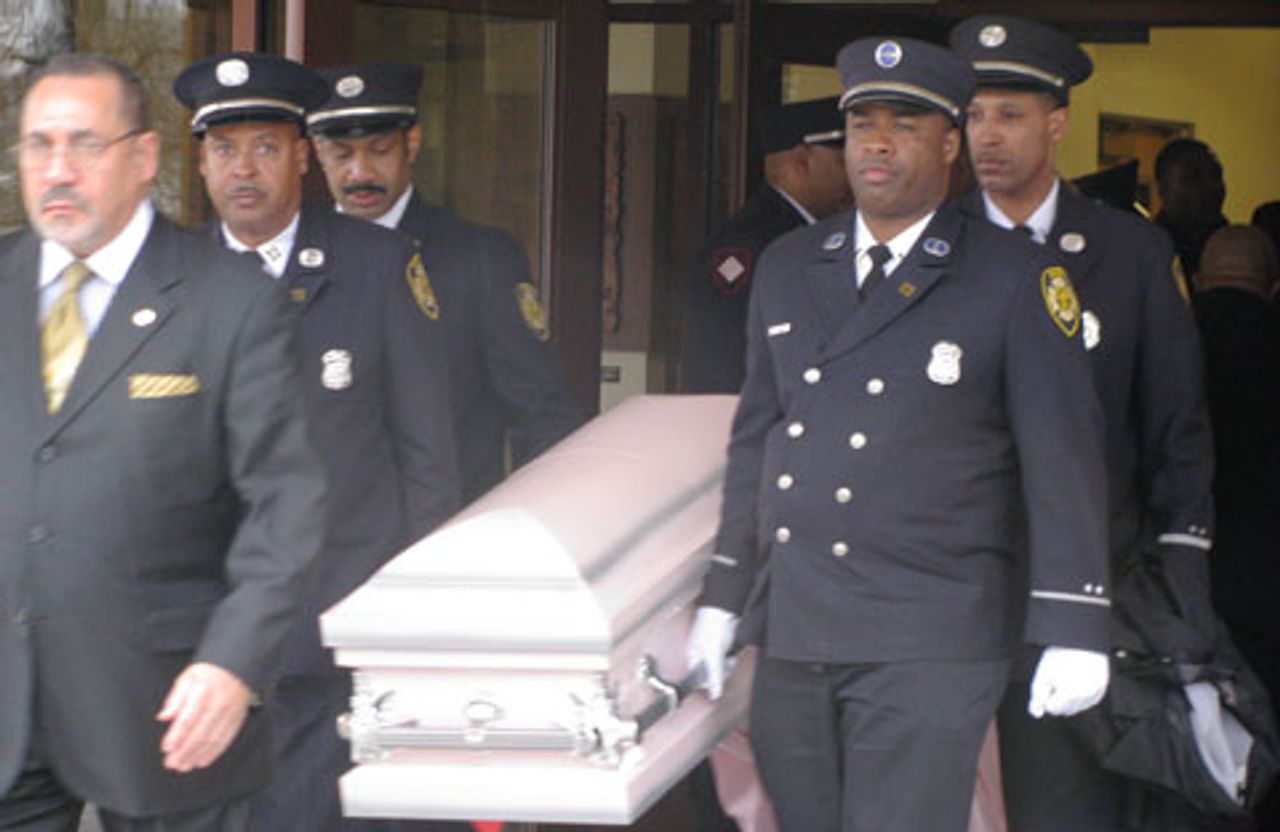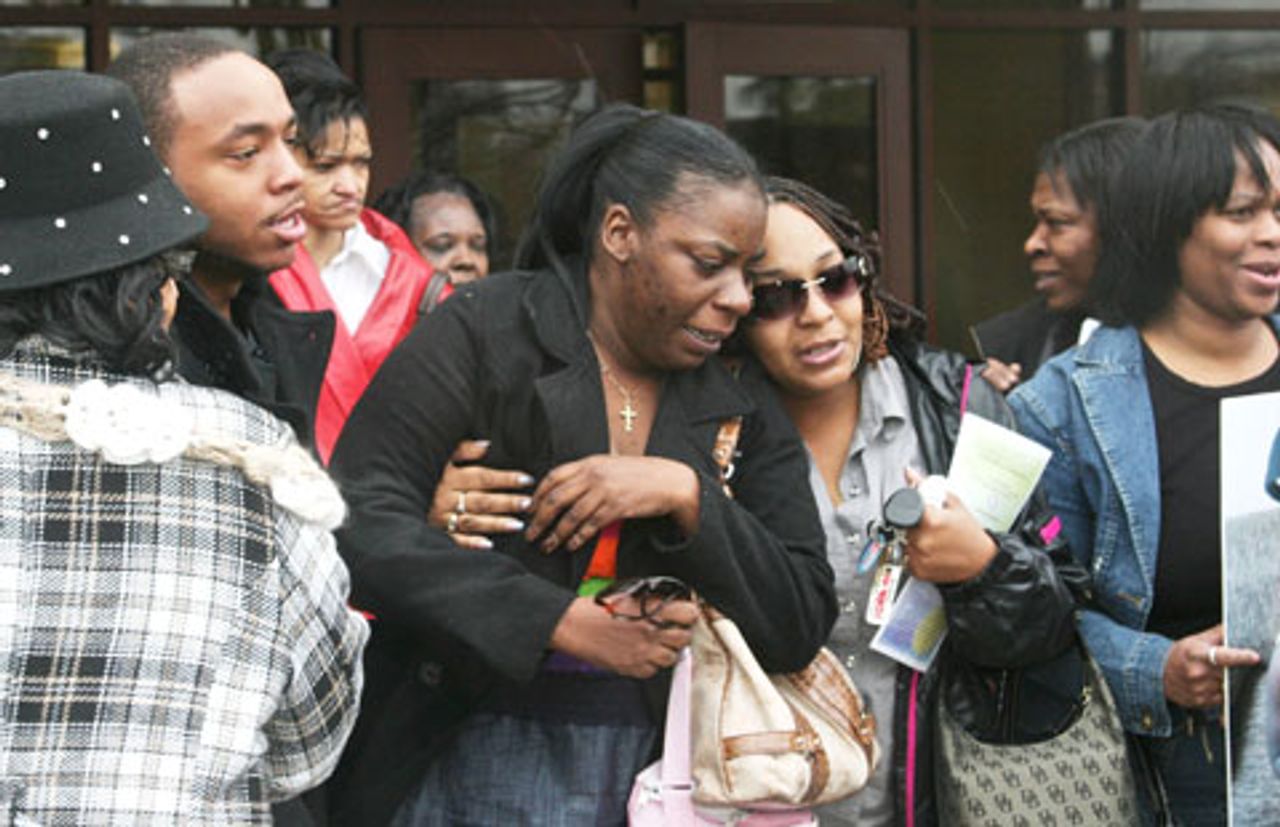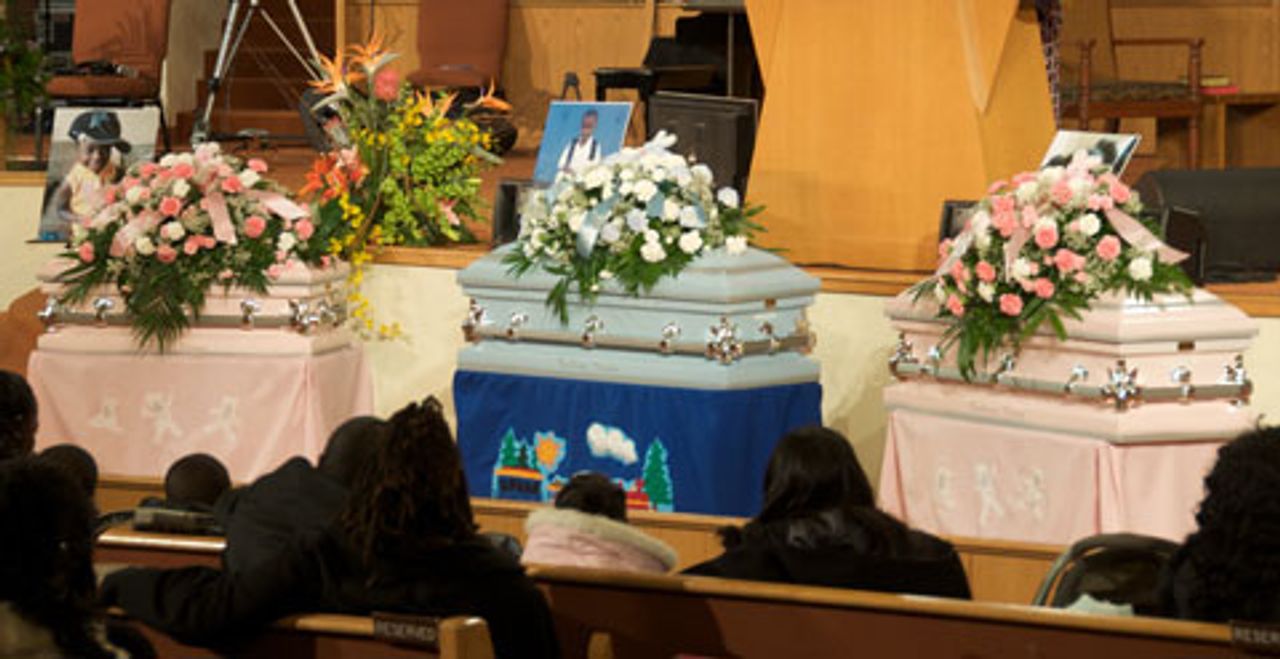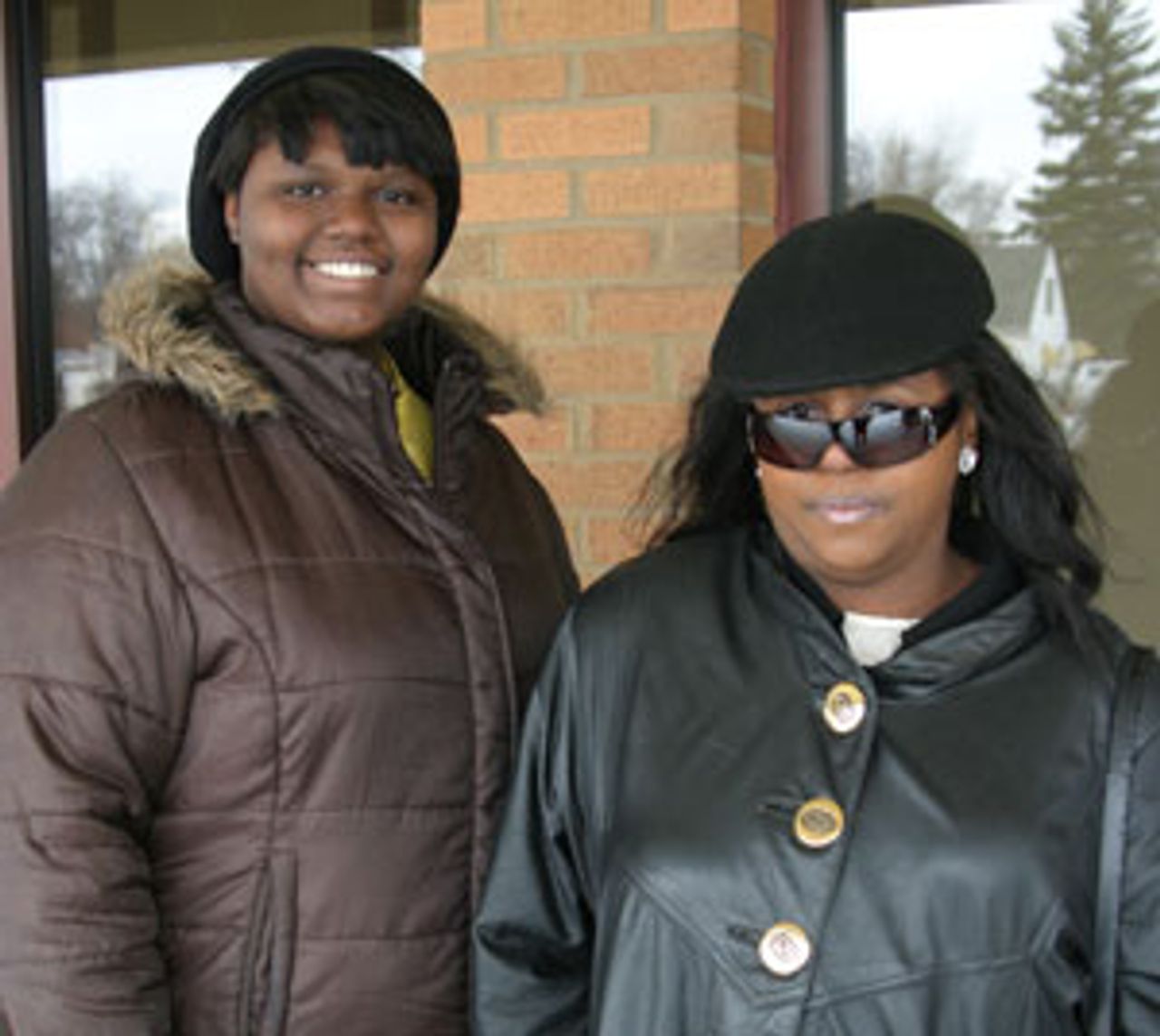 Detroit firefighters carrying one of the girls
Detroit firefighters carrying one of the girlsHundreds of people attended a funeral on Saturday in Detroit for three small children who were killed in a March 2 house fire on Bangor Street on the city’s west side. The fire—believed to have been caused by a space heater—started shortly after the local utility company DTE Energy shut off gas and electrical service to their home.
The event highlighted the human cost of such policies. Three small coffins—one blue and two pink—stood at the head of the massive room at the Fellowship Chapel, next to a series of pictures showing the children at play and highlighting their joy with their young mother, Sylvia Young, and other family members.
 Trávion, Selena and Fantasia Young
Trávion, Selena and Fantasia YoungLost in the fire were Trávion Travis Young, five, Fantasia Savannah Young, four, and Selena Anatasia Young, three. Four other children—including a four-month-old infant—only survived the devastating fire due to quick action by Sylvia’s 11-year-old son and the help of neighbors.
In addition to family and friends, teachers and many others came to the service express their sympathy and solidarity with the Young family. A large delegation of Detroit firefighters attended, with several acting as pallbearers.
 Sylvia Young (center) being aided by family members
Sylvia Young (center) being aided by family membersThe funeral was a significant display of support for 30-year-old Sylvia Young, who has been maligned by the news media, state officials and the utility company. The first media accounts of the fire claimed Young had been at a “party store” at the time it occurred, a clear suggestion that she was out buying liquor and had abandoned her children. In fact, Young was at a local discount store buying additional space heaters and had them in her hand when she returned to see her home engulfed by flames.
In an effort to conceal its own responsibility, the utility company then accused Young of “stealing” electricity because the home, like thousands of others in the city’s impoverished neighborhoods, had an unauthorized electrical hook-up. In the hours before the fire, Young had pleaded with a DTE representative not to shut off service, explaining that her utilities were included as part of her rental agreement with her landlord. The representative said he had no time to wait for the landlord to arrive and proceeded to padlock the gas and electrical meters, cutting off heat to the young mother and her seven children.
The Michigan attorney general’s office has threatened to charge Young with negligence—for not being home at the time of the fire—and take away her remaining children. If anyone should face the charge of negligence, however, it should be officials from DTE Energy and the state regulators that approved its shut-off policy, who showed willful disregard for the consequences of their actions and were well aware that they were setting into motion a series of events that were likely to lead to tragedy.
During the period for tributes to the children at the funeral, a spokesperson for the firefighters said they shared in the family’s loss and the “blood, sweat and tears” of city residents. The night before, the Phoenix organization, a group of African-American firefighters, had hosted a dinner for the Young family at a local fire station.
 Coffins of the three children
Coffins of the three childrenA representative from the Sherrill Elementary School, which five-year-old Trávion attended, read condolences from the child’s kindergarten teachers and classmates. This was followed by a moving rendition of “Amazing Grace” by a young trumpet player.
Larry Porter spoke on behalf of the Socialist Equality Party and the Citizens Inquiry into the Dexter Ave. Utility Shut-offs and the Social crisis in Detroit. Expressing his deepest sympathies to Sylvia Young and her family, he said there had “been talk of taking her children away.” He said the family photographs of Sylvia and her children “proved the love she had for them every day.” He urged those in attendance to oppose the vindictive attack, and his remarks won a warm response from the audience.
The popular anger against DTE Energy—whose actions have led to several tragic fires this winter—and the growing support for the citizens inquiry have generated concern within the city’s Democratic Party political establishment, which enjoys close relations with the energy giant.
This fear was expressed in the remarks of Fred Durhal, a Democratic state representative from the Sixth District in Detroit. Durhal, who is also the vice chair of Michigan legislative Black Caucus, said he had met with DTE officials for three hours on Friday.
Durhal claimed, that “DTE knows it is difficult times and people are forced to do things they wouldn’t normally do,” in a reference to unauthorized hook-ups. “Sometimes,” he added, “it takes this kind of tragedy to get attention.” He claimed the entire state legislature was working hard to “resolve this.”
In fact, the main legislative action being prepared in the Michigan state legislature is a plan to impose even more punitive measures for so-called “energy theft.” The Detroit News reported last week that the utility company is “working with State Sen. Bruce Patterson, R-Canton Township, to beef up laws so there are stiffer penalties for those caught hooking up shut-off utilities for a fee, land owners who are repeatedly cited or whose tenants are repeatedly cited for energy theft, and those who attack shutoff workers. A package of bills has been crafted but not voted on.”
DTE, which made $546 million in profits last year and paid its CEO, Anthony F. Earley Jr., $7 million in 2008, has complained that it is losing millions due to “illegal” energy hook-ups.
The most politically conscious remarks at the service were made by Reverend Wendell Anthony, the head of the Detroit NAACP. Directing his comments to the grieving young mother, he said, “After a tragedy like this it is common to say why did it happen to us? Why did I deserve this? But it is futile to ask,” he insisted. He said she had two choices, either wallowing “in a sea of resentment” or concentrating on raising her remaining children.
In a clear reference to those proposing a fight against DTE and its utility shut-offs, in particular the citizens inquiry being organized by the SEP, the reverend warned, “Don’t let the devil tempt you. The devil wants a victory out of this. He wants folks to cuss other folks. He wants folks resenting each other and pointing fingers at each other. He doesn’t want to see people coming together.”
Anthony said, “The energy company and the people that need help have to come together around a round table. We can’t go off on each other,” comparing this to a family overcoming its differences in a time of tragedy.
Anthony’s main concern is that after years of spearheading the attack on the working class on behalf of big business, the Democratic Party in Detroit has lost its credibility. So too has the official civil rights establishment.
Both Rev. Anthony and DTE CEO Anthony Earley are prominent supporters of Mayor David Bing, who is overseeing a vicious attack on city workers and social services, including public education. During his eulogy Anthony managed to make a plug for the mayor’s school “reform,” which consists of closing of dozens of schools and turning them over to private charter companies.
After the funeral several people spoke to the WSWS about the tragedy. Bernice Chisolm said, “Having utilities isn’t a luxury or something for pleasure. It is a necessity. We have to have heat and lights to live in a city. We can’t use oil lamps and wooden fires to heat our homes like we are in the country. DTE should never have cut Sylvia off with children in the house. They should have looked out for her. That’s why there are all these tragedies.”
 Pearl Sugufara
Pearl SugufaraPearl Sugufara said, “I don’t like this situation at all. Those were my nieces and nephew who died. A lot of us are in the same situation with the utility companies. I lived in an apartment building and the landlord was supposed to pay for the lights and gas—but DTE cut me off anyway. The landlord did something with the gas lines and passed on the costs to me. I went to DTE and talked with them but they couldn’t care less.”
Asked about state representatives’ comments that DTE would resolve this problem, Pearl said, “I heard politicians say that before and it hasn’t changed. I went to the weeklong event at Wayne County Community College where DTE was supposed to help people. I didn’t get any results. I tried to get service on at my new home. But they wouldn’t let me do it because of the outstanding bill my landlord left me.
“When I finally got service my bills started at $50 a month and went to $500. I called DTE and said they must have put the decimal in the wrong place. How can people afford these rate hikes when they are living on a fixed income? I worked for an auto parts plant and was laid off in 2008. I am making $476 every two weeks on unemployment, with $550 coming out for rent.”
Stephanie Spivey knew the Reed-Owens family whose utilities were shut off on July 16, 2009 resulting in the deaths of four family members. The family was desperate when DTE cut off power because several members suffered from asthma, neurofibromatosis and bronchitis and required the use of an electric breathing machine. After their electricity was cut off, a generator was hooked up in the basement. The family was unaware of the danger and died from carbon monoxide poisoning. Stephanie commented, “None of these children had to die. I knew both families and they were facing similar conditions. They were hurting and no one helped. DTE Energy is totally responsible.”
 J. Gatlin (right) and her neice
J. Gatlin (right) and her neiceJ. Gatlin, a teacher currently on disability, said, “There is no excuse for what happened. There are all kinds of people out there sitting in the cold without heat. There needs to be some kind of progam in place for those who are out of work or who can’t fend for themselves.”
She told of her own struggles as a Detroit teacher, “I understand what everyone is going through. I had a time when I had no heat. I am on a payment plan right now.”
Niambi Young, who is related to the Young family, commented, “The claim that DTE will assist you and that there are agencies to help people is a lie. I just changed residences and needed to have my lights and heat turned on in the new place. I was told by DTE that an outstanding bill of $2,600 had to be paid before this could happen or they would not provide services. How do they expect people to come up with that type of money?”
